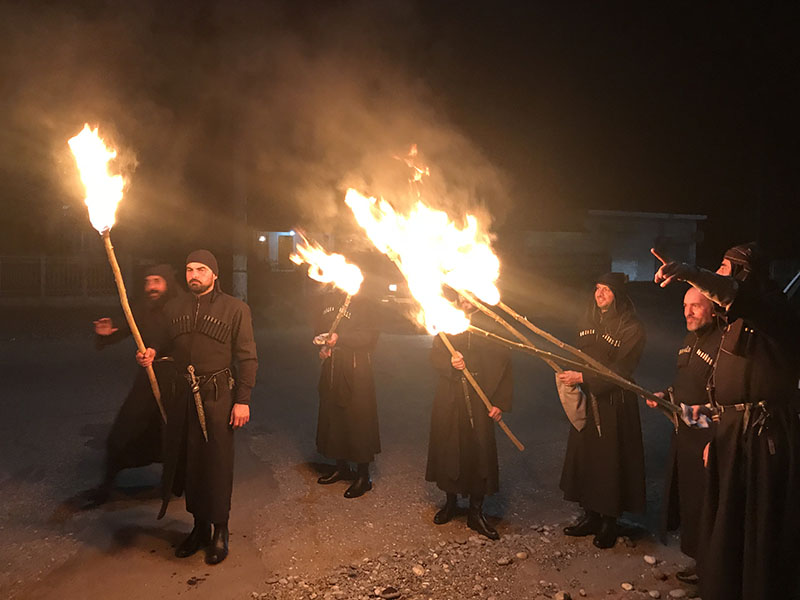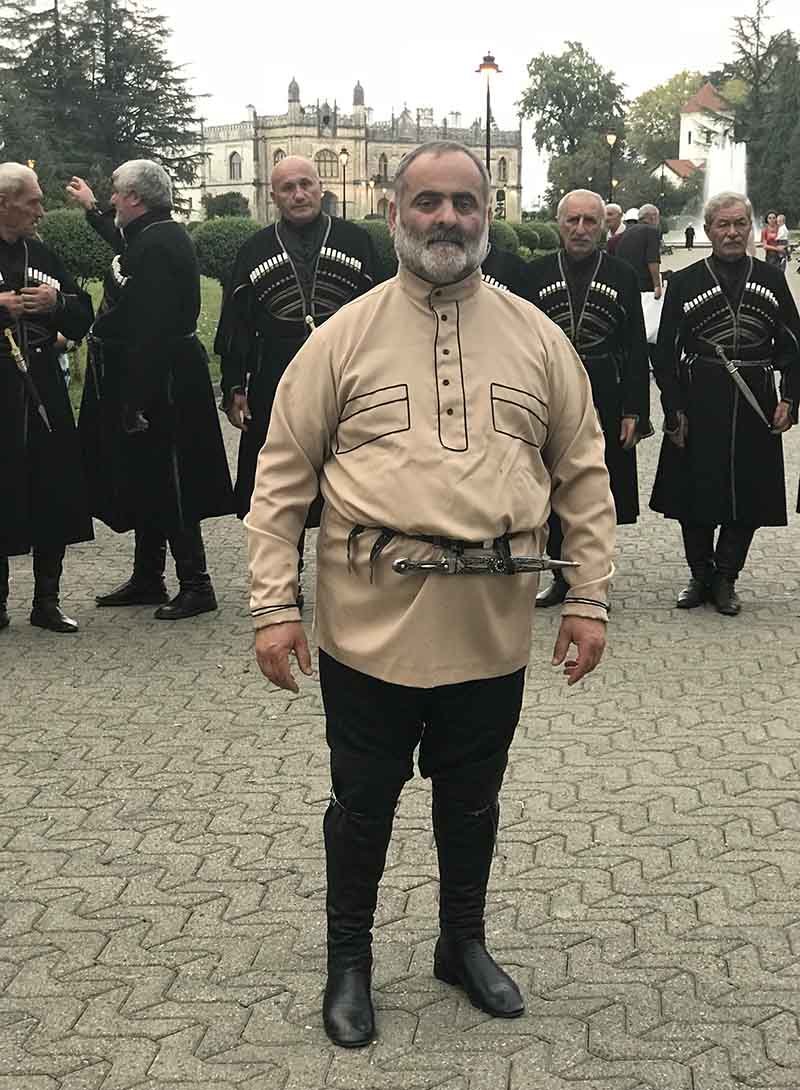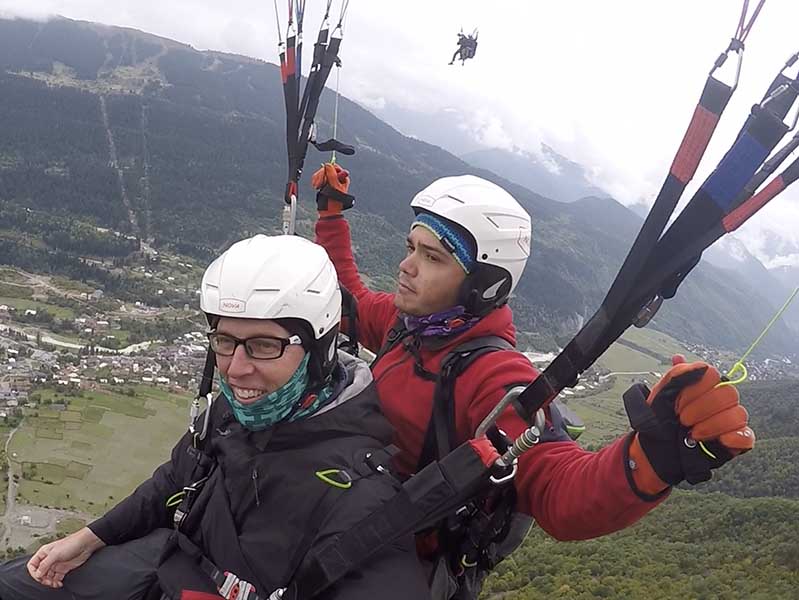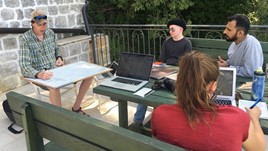
By Tim Neville
Travel Writer8 Jan 2020 - 6 Minute Read
One night, last autumn, not far from where the Greater Caucus Mountains relax into the plains pressing against the eastern Black Sea, a dozen men marched through the streets of Zugdidi, a city of about 50,000 people in the northwest of the Republic of Georgia. I stood watching in awe. They wore black head scarves and black coats called chokhas that fell to their ankles and were gathered around their waists with belts bearing ceremonials swords. Vials of fake gunpowder ran across their breasts, each canister stitched into the wool. Each man carried a fiery torch that splashed the asphalt in a molten, flickering glow.
Beso Chitanava stood on his front stoop watching. The 52-year-old music teacher, with a stocky frame and graying beard, specializes in preserving Georgia’s folkloric traditions. He knew the men were coming; everyone in the neighborhood knew, even me. It was impossible to ignore their singing, their voices floating on harmonies that bounced around in your ribs. Then Beso sung back, his rich baritone folding into the polyphonic melody like butter into dough.

Georgia, once part of the Soviet Union, might be best known these days for its plight against the Russians, who rolled into the country in 2008 to carve out an oblast in South Ossetia that left Georgia nearly cleaved in two. But the nation’s spirit could not be snuffed out. For travelers, it’s a haven of fairy book landscapes, fascinating cities, and a culture still preserved in song that has survived despite countless invasions.
Words that rattle bones
I had arrived a few days earlier to hike among the towering peaks of the Caucuses that scrape the sky at 16,000ft (4,875m). I had already wandered to the holy caves along the Azerbaijani border and sat around a crackling bonfire late at night, drinking wine that had nearly gone extinct under the Soviets. The food – savory dumplings, cheesy breads – spread out on enormous tables laid with fare for 50 villagers, would leave me pining for months. But it was the Georgian singing that continued to haunt me. In all of my travels, I’d never heard anything quite like it. If Gregorian chants are angelic and almost feathery, these songs, sung in the Mingrelian language, felt fully rooted in the earth, with powerful, booming choruses that could roll a rock.
The Georgians have had centuries to perfect this, and hearing it was like standing before an aural wormhole that pierced time. The tradition extends back more than 1,000 years and is considered so valuable that the United Nations recognizes it as an intangible cultural heritage for all of humanity. Right now, more than 11 billion miles from Earth, the Voyager 2 probe, launched in 1977, carries a gold record of music from Chuck Berry, Mozart, and a complex Georgian gem called Chakrulo. The hymns and carols are sung a cappella, in a blend of vocal ranges that meld into a work of art greater than the sum of its notes.
“When the song gets inside you,” whispered Alex Iskandarov, my guide and friend, “you feel it in your bones. The words are very emotional.”

Plenty of cultures celebrate, mourn, and otherwise express the twists and turns of their lives through music. The Germans and the Irish have their drinking songs. The Swiss yodel. Go to a wedding in eastern Europe, and you’re almost guaranteed to run into a man with an accordion belting out songs about love and girls with flowers in their hair. “A lot of those songs are very simplistic stories,” Marta Mills, a sustainable travel consultant who has traveled to Georgia 17 times, told me later. “Georgian songs are much more sophisticated. They will make you cry.”
Spontaneous eruptions
Stopping at Beso’s house, the men laid down their long torches, extinguishing them in sand. Beso welcomed them for a singing session in his house. In a corner, near a four-stringed instrument called a choghur, was a Zimmerman piano from 1884. Beso, who has dedicated the bulk of his life to music, sometimes lies awake late at night composing songs that he hopes Georgians will sing someday, not knowing who wrote them. “I’m a bridge,” he said. “I build them between the past and the future.”
A few days later, I was still processing what I’d witnessed. Alex had taken me paragliding high over the village of Mestia, an enclave deep in the Caucuses a few hours north of Zugdidi. The hamlet was spellbindingly beautiful, a fable made manifest with 15,000-foot peaks bracing against 10th-century stone towers that erupted like exclamation points over the low roofs.

We landed in a field and found a restaurant to celebrate in. Sitting before a table heavy with dumplings and wine, Alex explained how every Georgian is a Beso – a vessel for a culture preserved in layers of song.
“You can be sure that almost any one of these guys can sing,” he said, gesturing around the room. Two tables over, a group of men, construction workers perhaps, sat chatting over a bottle of wine.
The workers called for another bottle. One of them drew a long breath, as if he were about to sigh – but out came a low droning. Another joined in, then another, for no reason at all, other than they all seemed intent on finishing what another had started. The room grew quiet and the hairs on my arm stood up, as two more men came in with a higher melody, and then a higher melody still.
How cool would it be, I thought, if my buddies and I could belly up to our favorite dive bar and burst into a song that could shut the place down.
It didn’t matter that I couldn’t understand the lyrics. When it was over, a Russian tourist clapped. A man at the bar touched his chest over his heart and smiled. Then, they sang again.
Discover similar stories in
connection
Travel Writer
Tim is a correspondent for Outside magazine and a frequent contributor to the New York Times. His work has been featured in Best American Travel Writing, Best American Sports Writing and Best Food Writing.




No Comments